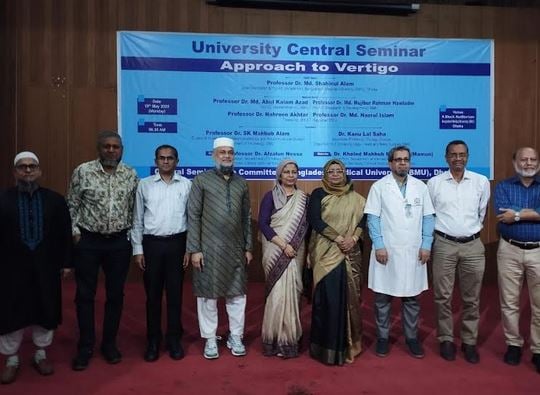News Flash
News Flash

DHAKA, May 19, 2025 (BSS) – Experts at a seminar titled “Approach to Vertigo" today highlighted the importance of diagnosing the root cause of this disease before initiating treatment to ensure effective medical intervention.
They said vertigo can arise from various underlying causes, including inner ear disorders, vestibular system dysfunction, neurological conditions, medication side effects, brain-related issues, and vision problems.
Bangladesh Medical University (BMU) today hosted a seminar, shedding light on the condition that leads to dizziness, spinning sensations, and loss of balance.
Organized by BMU's Central Seminar Sub-Committee, the event was held at the university’s A-Block Auditorium, according to a press release.
BMU Pro-Vice Chancellor (Research and Development) Professor Dr Md Mujibur Rahman Howlader, Treasurer Professor Dr Nahrin Akhtar and Dean of Faculty of Paediatric Professor Dr Md Atiar Rahman spoke at the event.
With Central Seminar Sub Committee Chairperson Professor Dr Afzalun Nesa in the chair, the event was moderated by Dr Khaled Mahbub Morshed (Mamun).
At the seminar, Professor Dr. SK Mahbub Alam from the Department of Neurology presented the procedures on the use of medication for treating vertigo caused by neurological issues. Besides, Dr. Kanu Lal Saha, Associate Professor of the Department of ENT, discussed treatments for vertigo related to inner ear disorders, including surgical interventions.
Speaking at the event, Dr. Md. Mujibur Rahman Howlader emphasized that such a central seminar plays a crucial role in enhancing the diagnosis and advanced treatment of vertigo.
Dr. Nahrin Akhtar noted that vertigo primarily falls under the expertise of neurology and ear, nose, and throat specialists. She added that today’s seminar, about vertigo, would contribute to the latest advancements in treating the condition while facilitating the dissemination of essential knowledge for its proper management.
Experts at the seminar explained that vertigo is a common condition characterized by dizziness, often resulting from various underlying factors.
Patients experiencing vertigo may feel as though their surroundings are spinning, or at times, they themselves may feel a sense of rotation. This can lead to difficulties in walking and an increased risk of falling.
Vertigo can be triggered by factors such as bodily imbalances, ear disorders, brain conditions, disruptions in the connection between the ear and the brain, vision problems, medication side effects, diabetes, thyroid disorders, heart disease, and low blood pressure.
Diagnosis involves assessing the patient's medical history and conducting clinical examinations. Effective treatment requires identifying the root cause of vertigo to provide targeted medical intervention.
Treatment approaches may include specialized exercises, rehabilitation therapy, physiotherapy, ear surgery, and care for conditions like brain stroke. In some cases, certain exercises- learned from a doctor and practiced regularly- can significantly accelerate recovery.